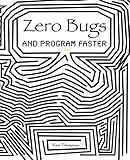Found in 3 comments on Hacker News
ktRolster · 2016-07-23
· Original
thread
If you're having trouble, this book can help you: https://www.amazon.com/Zero-Bugs-Program-Faster-Thompson/dp/...
ktRolster · 2016-05-23
· Original
thread
Here's another good book I recommend while we're at it: http://www.amazon.com/dp/0996193308
(disclaimer: I wrote it :)
ktRolster · 2016-02-14
· Original
thread
> How did you get into such issues? Were there classes where you got started, or was it all on the job?
> I'm not sure how you would move lock/unlock pairs to the top of a file from different functions/scopes.
> It's more about a codebase that's almost perfectly right, but where I'm scared to change anything because I don't have a big-picture model of the concurrency in my head..
Sometimes there is like a critical 'zone,' where a thread acquires the lock when it enters, and releases when it leaves. For example, it could acquire the lock when it enters a class method, and releases it when it leaves the class. Then the class becomes the critical zone.
Maybe learning to think of 'critical zones' is the most important skill to understanding the big picture?

